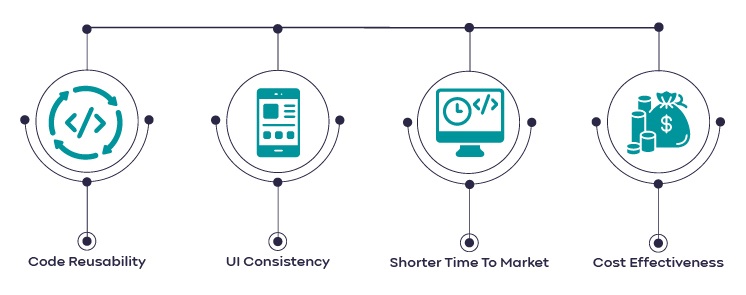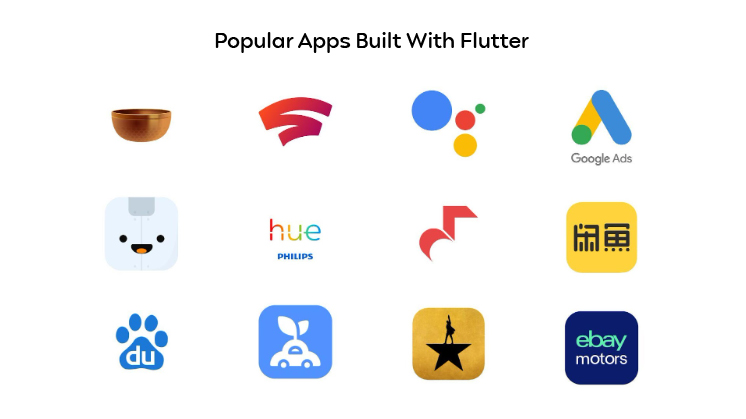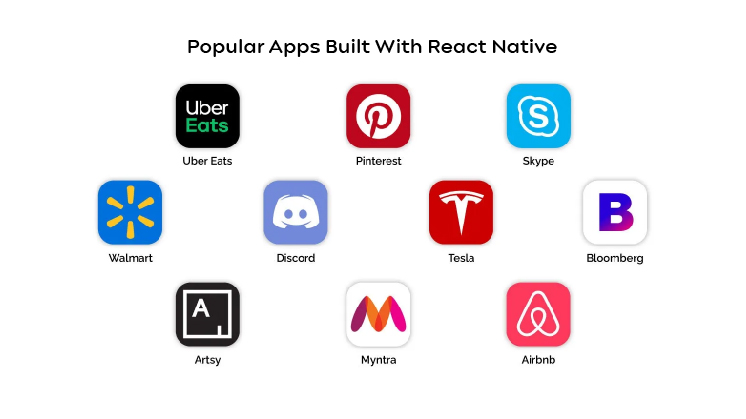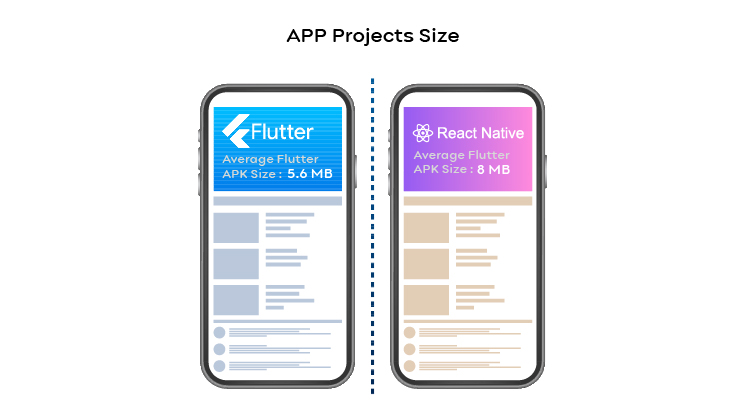The competition between Native and Flutter frameworks is fierce, making it challenging to discern the differences between React Native and Flutter for app development. A logical decision approach is to compare the two based on pertinent aspects.
Both React Native and Flutter endorse the concept of drafting a single codebase that serves multiple mobile platforms—Android and iOS. This approach makes identical apps available to users on each platform, minimizing testing efforts by nearly half.
This efficiency arises from the ease of creating fewer tests modified to different mobile platforms.
In terms of popularity, both frameworks have contributed to the success of numerous well-known applications. Notable examples of Flutter-driven apps include the Google Ads app, SpaceX, and the eBay Motors app.
React Native, on the other hand, has been active in creating apps for Instagram, Facebook, Pinterest, and more.
This article aims to guide you in determining whether Flutter or React Native is the superior choice.
This facilitates faster coding, development, and streamlined bug-fixing.
Now, let’s proceed with the comparison:
Reasons To Choose Flutter Over React Native:

1. Ease of Learning
When developers contemplate the choice between Flutter and React Native, a key consideration is which language to learn. From a developer’s standpoint, React Native proves more accessible because it employs JavaScript as its programming language.
Given JavaScript’s longstanding presence, many developers are already well-acquainted with it. On the other hand, Flutter uses Dart, a relatively newer language, which could entail a steeper learning curve.
However, this doesn’t imply that Dart makes Flutter inherently challenging. Instead, Dart is just one facet of Google’s comprehensive platform, which will be further explored.
2. Community Support
Strong support from the global development community is precious for developers engaged in cross-platform development. Given React Native’s earlier launch date, it boasts a mature and expansive online community that offers substantial support.
This readily accessible community helps resolve issues and challenges during the app development process.
Nevertheless, Flutter is rapidly gaining traction, and consequently, its developer community is on the rise. It’s reasonable to anticipate significant growth in the Flutter community throughout 2020.
Hence, the relatively emerging state of Flutter’s community shouldn’t be a significant deterrent when considering the framework.
3. Performance
Performance stands as a critical criterion for evaluating any framework. While JavaScript-based frameworks mitigate performance concerns to an extent, some JavaScript frameworks designed for web development do not seamlessly translate to enhanced mobile performance.
Conversely, frameworks like TezJS optimize Core Web Vitals, delivering exceptional speed even on mobile platforms.
When comparing the performance of React Native and Flutter, React Native employs JavaScript bridges or layers to run hybrid apps on various mobile platforms. Flutter circumvents this additional layer through its capacity to reuse existing code without relying on JavaScript bridges.
Unlike React Native, Flutter compiles directly to native code. This distinction eradicates the need for repetitive interactions with a JavaScript layer for compilation.
Such characteristics position Flutter as superior not only to React Native but also to various other cross-platform application development frameworks.
4. Widgets vs. Third-party Libraries
A significant distinction between these frameworks lies in their reliance on third-party libraries. Flutter, designed by Google, has a range of impressive widgets and libraries.
These built-in components empower mobile application development to achieve consistent user interfaces for Android and iOS platforms. Conversely, React Native necessitates developers to turn to external third-party libraries frequently.
This variance undoubtedly accelerates development for Flutter developers.
Moreover, this contrast extends to the testing methodology employed in app development with these frameworks. Flutter’s robust widget testing support streamlines and expedites tasks for Flutter developers, whereas React Native developers often rely on external tools for testing purposes.
5. Documentation Support
Given Flutter’s affiliation with Google, its documentation support is expected to be comprehensive. The Flutter framework provides detailed and informative content as an invaluable reference for experts in cross-platform development.
While React Native’s documentation support is commendable, it also tends to offer more generalized content, lacking the precision found in Flutter’s resources. React Native’s app development guides appear disorganized, presenting challenges for developers seeking coherent guidance.
6. Additional Points
- Ease of Installation: React Native installation is expedited through the Node Package Manager, making the process more swift. In contrast, Flutter users must undertake additional steps to set up the development kit.
- Development Time: Flutter’s framework facilitates shorter time-to-market due to its robust widget support. However, this advantage fully materializes when skilled developers proficient in Dart programming are involved. React Native enables swift development, though its increased reliance on native components and JavaScript bridges could extend the development timeline.
- CI/CD Support: Flutter boasts a user-friendly command-line interface (CLI) that simplifies the setup of continuous integration (CI) and continuous delivery (CD) processes. In contrast, React Native lacks explicit guidance for establishing CI/CD services. Additionally, Flutter’s CLI allows automated app deployment, streamlining the release of apps on diverse app stores across various mobile platforms. Such capability is critical in cross-platform development, and Flutter excels in fulfilling this requirement.
Choosing Between Flutter and React Native
The current setting has seen a heightened acceptance of cross-platform apps. Making the right choice is important to stay competitive in delivering quality apps. The decision between Flutter and React Native is based on evaluating the benefits of cross-platform app development.
- Code Reusability: Flutter’s widget support translates to highly efficient and effective code reusability, surpassing that of React Native.
- UI Consistency: Flutter renders consistent UI designs for the two major mobile platforms, iOS and Android.
- Shorter Time-to-Market: As previously discussed, Flutter’s promise of reduced development time positions it favorably against React Native.
- Cost-Effectiveness: The development cost remains comparable between the two frameworks; however, it relies heavily on the development team’s expertise.
- Extended Reach: Cross-platform apps inherently boast a broader reach compared to native apps, contingent on the quality of the out-of-the-box app design.
Choose for Flutter if:
- Native functionality isn’t a necessity.
- Budget and time constraints are pressing.
- Speedy product launch and code efficiency are priorities.
- A single codebase supporting multiple platforms is required.
- A user-friendly interface with customizable widgets is needed.

Choose for React Native if:
- Scaling an existing project with cross-platform modules is the goal.
- Time and budget constraints are more flexible.
- Developing lightweight native apps is the objective.
- Creating shared APIs out of the box is crucial.
- The need to build an aesthetically appealing UI.

The Future of Flutter and React Native
In 2023, many organizations are using Flutter for their project needs, with its consistent improvements and new features within the Flutter SDK as Google evolves its toolkit. The recent release of Flutter 3.13 further extends its 2D scrolling, new graphics renderer, and faster graphics.
React Native remains a prominent choice, utilized even by Facebook in large-scale re-architecture efforts. Both frameworks continue to evolve with new features, enhanced performance, and better ecosystem support.
React Native vs. Flutter: Comparison (2023)
Flutter and React Native are open-source platforms, but their fundamental approaches differ. Flutter is designed for cross-platform apps with an integrated codebase, while React Native is designed for native apps running on iOS and Android platforms.
Notably, Flutter is compatible with Android SDK 21-34 and iOS 16, whereas React Native is compatible with all Android versions higher than 4.1 (API 16) and iOS 15. Additionally, Flutter incorporates Google-developed plugins like geolocation and mapping.
A key distinction emerges in their compilation approach. React Native runs JavaScript code directly without compiling it into native languages (Java, Swift, or Objective-C), which can affect speed. In contrast, Flutter compiles Dart code into native code, potentially enhancing performance.
Performance-wise, Flutter operates without reliance on new APIs, streamlining the interaction between the device and codebase.
Furthermore, React Native uses JSX—a blend of JavaScript and XML-like markup—while Flutter uses Google’s Dart language. Seeking professional assistance or leveraging ReactJS development services can help navigate JSX or XML challenges and ensure optimal app creation.

Conclusion
Considering the 2023 comparison between Flutter and React Native, React Native development relies on WebView and JavaScript, while Google’s cross-platform mobile development centers on the Dart compiler. Notably, the React Native framework can potentially introduce speed limitations to mobile apps.
Both frameworks excel within their respective domains. Your specific requirements and target audience should guide the selection of the ideal framework. If you are searching for an adept tool to convert your WordPress website into an Android or iOS app, APPExperts is the perfect partner to engage.
APPExperts is a robust no-code mobile app builder that integrates seamlessly with your WordPress website to build comprehensive iOS and Android applications.
